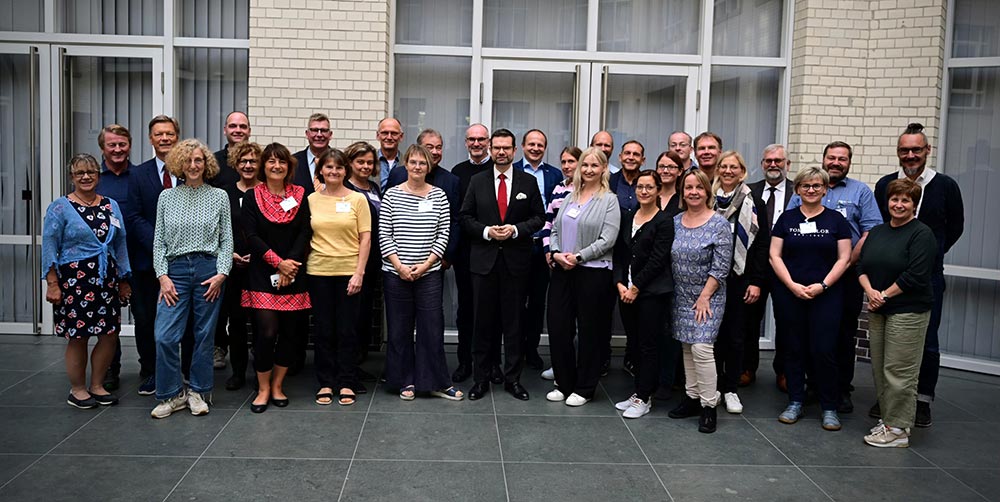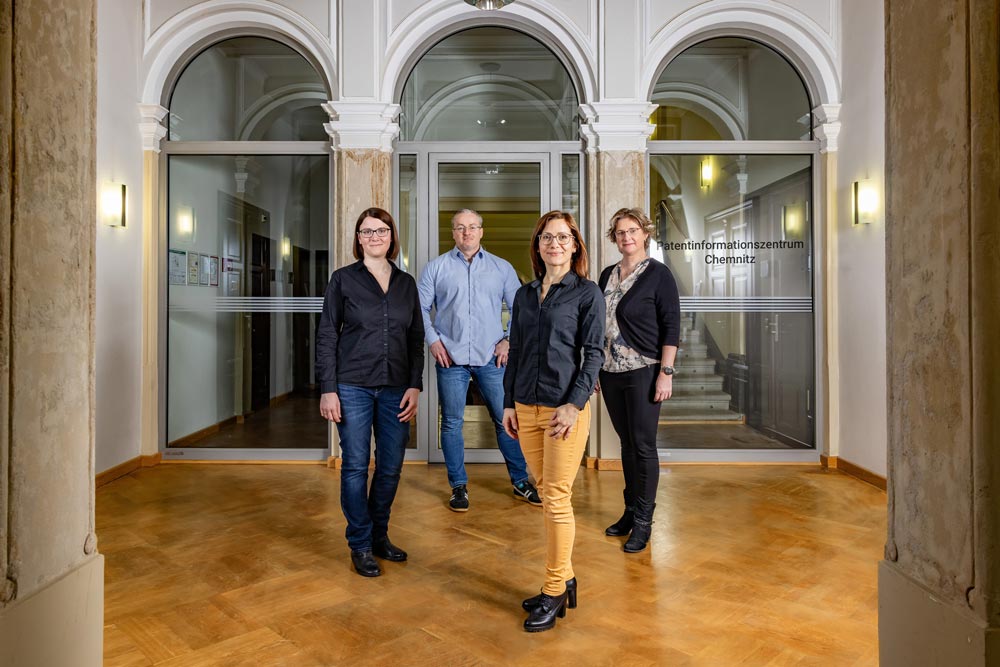
Overview National cooperation projects and User Advisory Council on Patents/Utility Models
Different organisations, one common goal: The DPMA fosters the expansion of a strong and competent network for the protection of intellectual property. Our partners are important agents in the field of commercial IP rights, such as chambers of industry and commerce, trade associations, innovation-promoting universities, but also the customs authorities. In cooperation with the patent information centres, we provide local expert support, in particular to small and medium-sized enterprises (SME).

Germany is known as the country of poets and thinkers, which is expressed in the popular German saying “Deutschland — das Land der Dichter und Denker”. What most people probably do not know is that this saying and the DPMA as well as the patent information centres (PIZ) have a similarly long history. There have been patent information centres for more than 150 years. In cooperation with the DPMA, they provide today's thinkers with the knowledge they need to protect their intellectual property. After all, achieving commercial realisation requires more than just being creative and having an idea. Knowledge of IP rights and their potential utilisation is essential in order to achieve an optimum of economic and financial benefits.

Locations of the German Patent and Trade Mark Office
The patent information centres form a network of highly competent, neutral and regional partners providing local information and giving advice on IP rights to inventors, small and medium-sized enterprises (SMEs), start-ups, colleges and universities. The PIZ make a decisive contribution to raising awareness of intellectual property among the public, industry and science. The DPMA supports the PIZ with privileged database access and staff training.
The patent information centres are represented at 19 locations in almost all lands and provide a comprehensive range of information and services — from the idea to the IP right and its exploitation. In addition, they offer free and on-site initial consultations for inventors as well as extensive search options in the various IP databases. The extensive range of services is supplemented by IP monitoring, events, training courses and workshops. Some patent information centres also accept IP applications. An informative overview of the PIZ and their services can be found here.
A highlight in the information portfolio of the patent information centres is the annual nationwide PIZnet Action Week, which took place under the motto “IP strategies for SMEs” in September 2023. All interested parties, especially teams of founders and start-ups, were able to obtain free local advice. As part of the approximately two-hour initial consultations (where no legal advice is given), advisors conduct an individual audit. Based on this audit, they discuss with the companies how to commercially exploit patents, utility models, trade marks, designs and copyrights. The concept of the Action Week was developed by the DPMA together with the PIZ and has already been implemented with great success in the past seven years.
We were happy to support the PIZ in promoting this Action Week, for example by means of a takeover of our DPMA LinkedIn account by selected patent information centres during this period. Some PIZ also make very active use of their own social media channels. Take a look and discover interesting information or ideas for exchanging views and experiences with the staff of the patent information centres — it's worth it!
In September 2023, our annual PIZ conference with the representatives of all 18 regional patent information centres (PIZ) and the competent specialist areas of the DPMA took place in Berlin.
On two eventful days, there was an intense exchange with the PIZ to discuss current topics such as the developments concerning the European patent with unitary effect and support programmes for small and medium-sized enterprises. The focus was once again on the joint activities of the DPMA and the PIZ that aim to promote the IP awareness among industry, the public and the research and higher education sector. The direct contact we have with the PIZ within the scope of this long-standing and trusted partnership regularly results in many new and interesting options to enhance this exclusive cooperation in the future.
The venue of the conference in 2023 was a particular highlight: the Federal Ministry of Justice on Mohrenstraße in Berlin, a place where you can delve deep into the history of German architecture and of Germany itself. Furthermore, Katja Behr, the head of the section for patent law at the Federal Ministry of Justice, took the opportunity to have a face-to-face discussion with the attendees to inform about the current developments at the Federal Ministry of Justice that were relevant to the PIZ. To conclude the event, which was fruitful for all attendees, a group photograph with the Federal Minister of Justice, Dr Marco Buschmann, was taken.

Since 2019, the DPMA User Advisory Council on Patents/Utility Models has been our central advisory body for the formulation and discussion of user needs and for the ongoing development of procedural processes at the DPMA. Due to its representative character, it is an essential part of the systematic dialogue with our user groups.
In 2023, the 15 external members (which ensure a representation of all relevant customer groups of the DPMA) exchanged views with the Senior Management and the colleagues of the DPMA. The discussions mainly dealt with the topic of “patent and procedure quality”.
Ensuring patent quality is our top priority. For this reason, we have dealt in detail with a wide range of issues relating to streamlining patent procedures. Our applicants and our office have a common interest in high patent quality. The comprehensive consultations and the wide range of substantial contributions from the advisory councils made it clear that we have taken a major step towards our goal of placing user needs even more firmly at the centre of our strategic considerations.
The DPMA presented initial steps to improve the quality of procedures. In particular, the focus was on ways to improve searches for examiners. For example, the office has included a course on search strategies in the training programme for all examiners. Among other things, this involves the most effective possible use of various search tools, which are also based on artificial intelligence. In addition, the DPMA has integrated new features for search documentation into its central IT processing system for patent procedures. This will facilitate the work of examiners within the context of future proceedings. Other measures related to the quality and standardisation of first office actions.
The DPMA would like to thank all members and representatives for their great commitment and looks forward to further cooperation.

Interview “Basic IP knowledge is best taught as early as in school”
Dr Carina Gerlach, Head of the Chemnitz Patent Information Centre, talks about her traditional location, support for inventors at universities, female role models — and the benefits of cooperating with the German Patent and Trade Mark Office.

The PIZ Chemnitz originates from one of the first German patent issuing centres. What does this long tradition mean to you?
Chemnitz has been closely associated with the German patent system almost since its inception. The city played certain role in the creation of the first German Patent Act. At the time, Chemnitz was a world-class industrial city in which numerous inventions were made that needed to be protected from imitators. In view of this long history of the patent system in Chemnitz, we are particularly proud to preserve this tradition here in Chemnitz and to offer our clients high-quality services to protect their intellectual property. The exciting and motivating thing about our daily work is gaining an insight into the innovative strength of the region and being available to inventors and founders as a partner and point of contact on the subject of IP rights.
How do you support your customers?
We raise awareness and provide information on IP protection, carry out patent and trade mark searches on behalf of our clients or support them with their own searches, hold seminars, arrange free initial consultations for inventors with local attorneys and act as a receiving centre for IP applications. We support independent inventors, founders, companies, research institutes, law firms and, of course, the employees of Chemnitz University of Technology as our supporting organisation. As staff of a PIZ, we keep ourselves up to date on current topics and on the needs of our customers through continuous further training and by making use of the programmes offered by the DPMA, the EPO and the PATONakademie, among others. We pass this knowledge on to our customers through consultations, training courses and by organising events. For example, we organise an annual series of lectures on current topics to mark World IP Day, such as last year on the unitary patent or this year, at the request of customers in our region, on IP strategies for SMEs.
What topics will the PIZ be dealing with in the near future?
Following the closure of some German patent information centres in recent years, we as member of the PIZnet network are particularly concerned with maintaining and strengthening the patent information centres so that we can continue to guarantee a network of regional IP contacts and close any regional gaps that have arisen. In addition, many PIZs, especially those that work closely with universities, are concerned with the question of how the WIPANO funding can be continued for universities. A new edition of the funding programme for companies has been launched. However, comparable support for university inventions from the federal or state governments is still lacking across the board.
You are one of these PIZs. Are there any other special concerns? What concerns you in Chemnitz?
Yes, we would like to see a more intensive integration of knowledge about IP rights in university education, or even better in school lessons. This would lay the foundations for future inventors — whether they later work for companies, universities, research institutes, start-ups or as independent inventors.
Another topic we are working on in Chemnitz is intensifying support for scientists at our university in the utilisation of their IP rights. And we are already looking forward to 2025, when Chemnitz will be the European Capital of Culture and we will be able to host the PIZnet annual conference that year of all years. We want to use this opportunity to show our guests the innovative strength and inventor culture in Chemnitz and the region.
You have actively participated in the DPMA's “Women in IP” series. Why is the topic of "women and IP rights" so important to you?
I found this campaign to be very suitable to make both female inventors and female entrepreneurs even more visible, but also to showcase innovations from our region to the public. The DPMA has given these women a prominent stage not only to present their inventions and business ideas, but also to be a role model for young people and those interested in starting a business. I think you can never do enough both to raise awareness of IP protection and to use the opportunities to inspire women for STEM subjects.
How does the DPMA support you in your work?
As a cooperation partner, the DPMA is our most important partner. It is very valuable for us to advertise us as a patent information centre as well as our services and events via the various communication channels of the DPMA with their wide reach, such as the website, the newsletter and on social networks. In addition, the DPMA supports us in organising training courses with demand-oriented topics specifically for our PIZnet network and provides us with speakers for regional PIZ events — for example, on World IP Day.
How useful is the contractual membership of the PIZ network?
This is very valuable for us. By fulfilling the cooperation agreement with the DPMA, we are a recognised patent information centre. This means that we are also a member of the German PIZnet network, which creates enormous added value for our daily work through the now weekly exchange of expertise and experience and the long-standing, trusting cooperation. Furthermore, as a patent information centre in the European context, we are one of over 300 PATLIBs (PATent LIBrary) and can therefore take advantage of many other support services from the European Patent Office and exchange information with other European PATLIBs.
Chemnitz and the German patent system — closely linked for a long time
At the suggestion of Dr Werner von Siemens and the first mayor of Chemnitz and lawyer Heinrich Friedrich Wilhelm André, the first German patent protection association was founded. Siemens commissioned André, among others, to draw up a draft for a patent act. This resulted in the first German Patent Act (Reichspatentgesetz) in 1877. One year later, the first patents, starting with patent specification no. 1, were published in the library of the Technical State Teaching Institutes in Chemnitz, today's university library.
The Imperial Patent Office promised to send all future patents in order for them to be stored in the patent display centre and made accessible to everyone. This makes the Chemnitz Patent Information Centre one of the first German patent issuing offices. The paper collection is still available at the Chemnitz site from the very first patent.
The outstanding importance of Chemnitz as a business location also became clear in the following years: 14 years after the German Patent Act had come into force, the number of patent applications from Chemnitz exceeded the national average by a factor of six.
Further information on the history can be found on the website of the PIZ Chemnitz